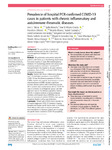Mostrar o rexistro simple do ítem
Prevalence of hospital PCR-confirmed COVID-19 cases in patients with chronic inflammatory and autoimmune rheumatic diseases
| dc.contributor.author | Pablos, José L. | |
| dc.contributor.author | Abasolo, Lydia | |
| dc.contributor.author | Álvaro-Gracia, José M. | |
| dc.contributor.author | Blanco García, Francisco J | |
| dc.contributor.author | Blanco, Ricardo | |
| dc.contributor.author | Castrejón, Isabel | |
| dc.contributor.author | Fernández-Fernández, David | |
| dc.contributor.author | Fernández-Gutiérrez, Benjamín | |
| dc.contributor.author | Galindo-Izquierdo, María | |
| dc.contributor.author | González-Gay, Miguel Á. | |
| dc.contributor.author | Manrique-Arija, Sara | |
| dc.contributor.author | Mena Vázquez, Natalia | |
| dc.contributor.author | Mera Varela, Antonio | |
| dc.contributor.author | Retuerto, Miriam | |
| dc.contributor.author | Seijas-López, Álvaro | |
| dc.date.accessioned | 2020-08-06T11:26:16Z | |
| dc.date.available | 2020-08-06T11:26:16Z | |
| dc.date.issued | 2020-06-12 | |
| dc.identifier.citation | Pablos JL, Abasolo L, Alvaro-Gracia JM, Blanco FJ, Blanco R, Castrejón I, et al. Prevalence of hospital PCR-confirmed COVID-19 cases in patients with chronic inflammatory and autoimmune rheumatic diseases. Ann Rheum Dis. 2020. Epub 2020 Jun 12 | es_ES |
| dc.identifier.issn | 0003-4967 | |
| dc.identifier.uri | http://hdl.handle.net/2183/26115 | |
| dc.description.abstract | [Abstract] Background: The susceptibility of patients with rheumatic diseases and the risks or benefits of immunosuppressive therapies for COVID-19 are unknown. Methods: We performed a retrospective study with patients under follow-up in rheumatology departments from seven hospitals in Spain. We matched updated databases of rheumatology patients with severe acute respiratory syndrome coronavirus 2-positive PCR tests performed in the hospital to the same reference populations. Rates of PCR+ confirmed COVID-19 were compared among groups. Results: Patients with chronic inflammatory diseases had 1.32-fold higher prevalence of hospital PCR+ COVID-19 than the reference population (0.76% vs 0.58%). Patients with systemic autoimmune or immune-mediated disease (AI/IMID) showed a significant increase, whereas patients with inflammatory arthritis (IA) or systemic lupus erythematosus did not. COVID-19 cases in some but not all diagnostic groups had older ages than cases in the reference population. Patients with IA on targeted-synthetic or biological disease-modifying antirheumatic drugs (DMARDs), but not those on conventional-synthetic DMARDs, had a greater prevalence despite a similar age distribution. Conclusion: Patients with AI/IMID show a variable risk of hospital-diagnosed COVID-19. Interplay of ageing, therapies and disease-specific factors seem to contribute. These data provide a basis to improve preventive recommendations to rheumatic patients and to analyse the specific factors involved in COVID-19 susceptibility. | es_ES |
| dc.description.sponsorship | Instituto de Salud Carlos III; RD16/0012 RETICS Program | es_ES |
| dc.language.iso | eng | es_ES |
| dc.publisher | BMJ | es_ES |
| dc.relation.uri | http://dx.doi.org/10.1136/annrheumdis-2020-217763 | es_ES |
| dc.rights | This article is made freely available for use in accordance with BMJ's website terms and conditions for the duration of the covid-19 pandemic or until otherwise determined by BMJ. You may use, download and print the article for any lawful, non-commercial purpose (including text and data mining) provided that all copyright notices and trade marks are retained. | es_ES |
| dc.subject | Arthritis | es_ES |
| dc.subject | Autoimmune diseases | es_ES |
| dc.subject | Biological therapy | es_ES |
| dc.subject | Epidemiology | es_ES |
| dc.title | Prevalence of hospital PCR-confirmed COVID-19 cases in patients with chronic inflammatory and autoimmune rheumatic diseases | es_ES |
| dc.type | info:eu-repo/semantics/article | es_ES |
| dc.rights.access | info:eu-repo/semantics/openAccess | es_ES |
| UDC.journalTitle | Annals of the Rheumatic Diseases | es_ES |
Ficheiros no ítem
Este ítem aparece na(s) seguinte(s) colección(s)
-
INIBIC- REUMA - Artigos [184]






